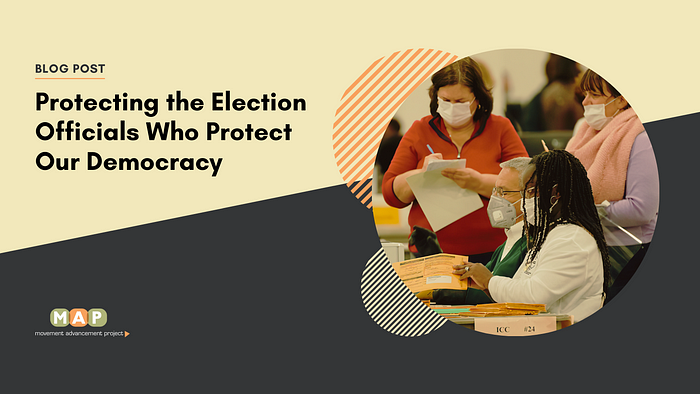
DEMOCRACY MAPS POLICY SPOTLIGHT:
Protecting the Election Officials Who Protect Our Democracy
Across the country, state and local election officials have been met with a wave of threats and intimidation unparalleled in recent history. Particularly in battleground states such as Arizona and Georgia, these officials and their families were terrorized simply for doing their job.
This is one of the many ways that unfounded claims of voter fraud surrounding the 2020 election have come at a cost. 2020 saw a marked increase in violent rhetoric and sentiments around the election, culminating in an attempted insurrection at the U.S. Capitol on January 6, 2021. And that violence was not contained to Washington D.C.
Nonpartisan Election Officials Report Feeling Unsafe
In a survey conducted by the Brennan Center in April 2021, one in three election officials reported feeling unsafe because of their job, and one in five listed threats to their lives as a job-related concern. These fears are contributing to the possibility of a “Great Resignation” of sorts among election officials, with up to a quarter of those officials reporting they are considering retirement before 2024. Such an exodus would accelerate the dangerous trend of extreme partisan actors seeking to fill these roles and further promulgating false theories of election fraud.
In Georgia, employees in a county elections office endured months of death threats, resulting in at least one staff person going into hiding. In Pennsylvania, a Republican member of the Philadelphia election board faced a series of threats, including to his family. In Vermont, police investigated threats against employees in the Elections Division of the Secretary of State’s office.
Protecting the Officials Who Protect Democracy
In response to this wave of threats and violence, the federal government as well as state legislatures are moving to better protect election officials. In January 2021, the U.S. Department of Justice indicted a man for threatening election officials in Georgia, the first action taken by the Department’s newly established Election Threats Task Force.
Federal law has stricter standards and penalties for these kinds of threats, but some states are looking to strengthen their generally applicable laws to provide additional safeguards for election officials.
In Colorado bill, Secretary of State Jena Griswold is supporting the Election Official Protection Act, which would increase protections in state law that currently prohibit interfering with an official’s work by adding language making it a crime to threaten or intimidate an election official.
A number of other states are taking up the initiative to protect election officials this legislative session. Among the notable bills that have been introduced:
- Illinois legislation would amend felony aggravated assault and battery statutes to specifically protect election officials who are assaulted or battered with the intent to retaliate or keep them from performing their duties.
- Maine’s bill would make it a crime for a person to intentionally interfere by any physical act with a person performing an official function relating to a federal, state or municipal election.
- Minnesota’s bill would make it a crime to intimidate or interfere with an election official in the performance of their duties. These protections would also apply to voters.
- New Hampshire’s bill would make it a felony to use or threaten force, violence, or any tactic of coercion or intimidation to knowingly discourage, interfere with, or compel any election officer.
- New Mexico’s bill would expand the scope of criminal intimidation statutes to include protections for employees and agents of the Secretary of State, County Clerks’, and Municipal Clerks’ offices.
- New York’s bill would make it a felony to intentionally cause physical injury to an election officer while such person is performing their assigned duties and amend aggravated harassment and obstruction of governmental administration to include election officers.
- Oregon’s bill would allow election workers to have their address exempted from disclosure as public record by county clerk and establish that the crime of harassment or aggravated harassment includes harassment against an election worker.
- Vermont’s bill would provide an enhanced penalty for the criminal threatening of election officials, public employees, and public servants.
- Two bills in Washington would make it a felony to harass election officials in the performance of their duties, and prohibit weapons at election related facilities, respectively.
MAP’s Democracy Maps track over 40 election laws and policies and as laws protecting election officials pass, we will add a map tracking states that explicitly protect election officials. Protecting election officials who are performing their duties in good faith has become more important than ever.
The thousands of officials across the country who run our elections do not deserve to live in fear simply for doing their jobs. The federal government, working with states, can and should do more to protect these people who work so hard to protect and uphold our democracy.
MAP will continue to provide relevant updates on this policy and others in our Democracy Maps, in addition to tracking emerging election issues.
